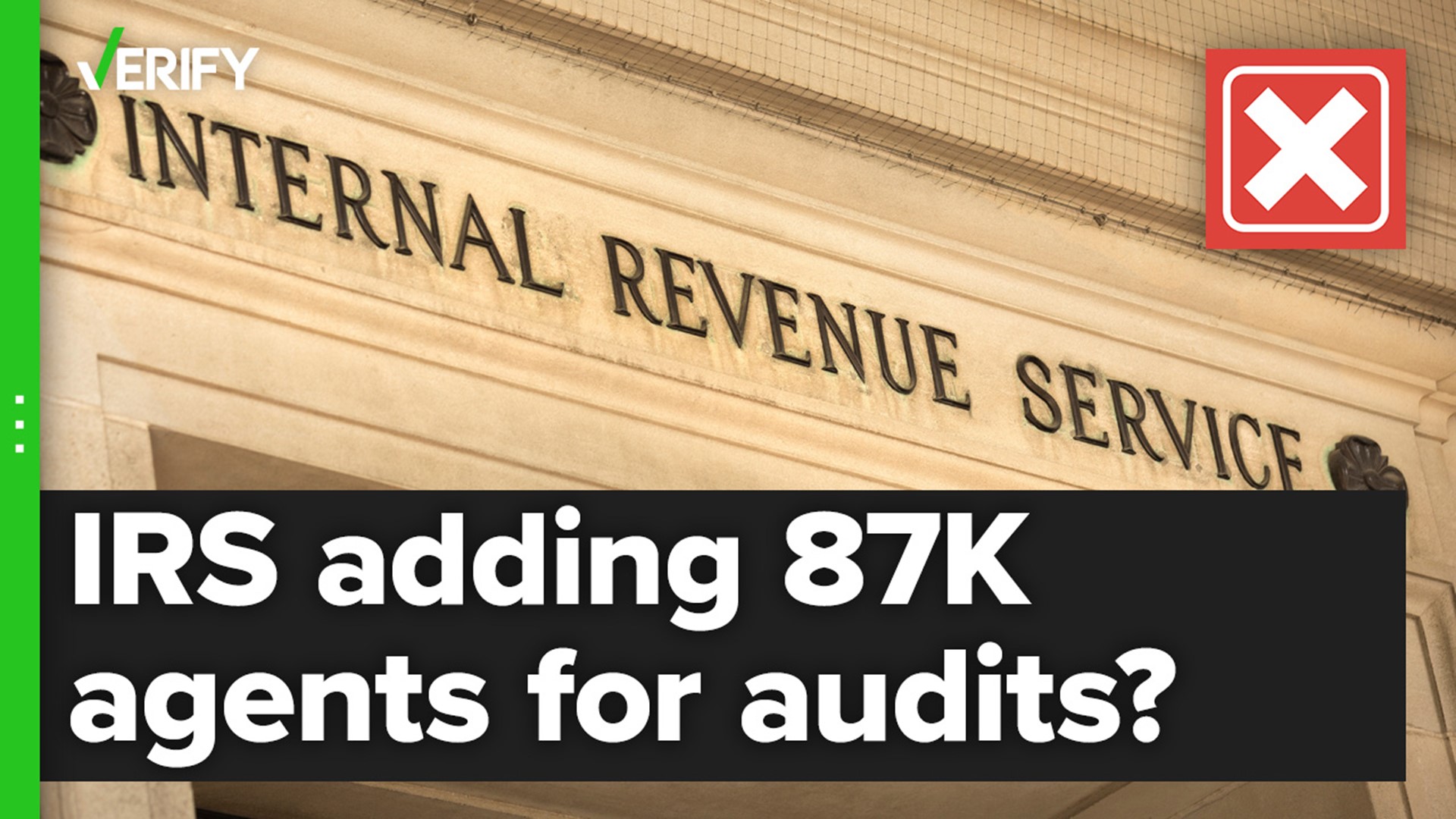On Aug. 16, President Joe Biden signed the Inflation Reduction Act of 2022 into law.
The legislation includes the largest-ever federal effort to combat climate change and aims to lower rising costs of goods while paying down the nation's debt. It also allocates funding to the Internal Revenue Service (IRS).
After the Senate passed the bill, people on Twitter claimed that the funding would allow the IRS to increase audits on middle-class Americans by hiring 87,000 new agents.
“Do you make $75,000 or less? Democrats' new army of 87,000 IRS agents will be coming for you — with 710,000 new audits for Americans who earn less than $75k,” House Minority Leader Kevin McCarthy (R-Calif.) wrote in a tweet.
THE QUESTION
Is the IRS increasing audits on the middle class by hiring 87,000 new agents?
THE SOURCES
THE ANSWER
No, the IRS is not increasing audits on the middle class by hiring 87,000 new agents.
WHAT WE FOUND
The Inflation Reduction Act of 2022 includes about $80 billion in funding for the IRS over the next 10 years.
About $45.6 billion of that IRS funding will be put toward expenses for IRS tax enforcement services through September 2031, including hiring more employees. But the legislation does not mention that the agency will hire 87,000 new agents specifically tasked with audits – and the U.S. Department of the Treasury says these claims are false.
The text of the Inflation Reduction Act doesn’t specify a number of new hires for the IRS. The 87,000 number shows up in a May 2021 report from the Treasury Department that estimated more funding allocated by President Joe Biden’s administration would allow the IRS to hire nearly 87,000 full-time employees by 2031.
That report was specific to previous legislation and it’s not clear yet how many people the IRS would hire with the Inflation Reduction Act funding.
Additionally, the IRS is expecting a large number of employees to leave in the next 10 years and will hire new staff to fill those roles. At least 50,000 staff members will leave or retire from the agency in the next five years alone, according to the Treasury Department.
These staff members work in various departments throughout the IRS and aren’t tasked with only enforcement. The IRS plans to determine the final numbers and breakdown of potential new staff for the next decade in the coming months, but the addition of new employees won’t mean increased audits for middle-class Americans, according to the Treasury and IRS.
“New staff will be hired to improve taxpayer services and experienced auditors who can take on corporate and high-end tax evaders, without increasing audit rates relative to historical norms for people earning under $400,000 each year,” a spokesperson for the Treasury Department said.
In a recent letter, IRS Commissioner Charles Rettig also assured Senate members that the IRS would not “increase audit scrutiny on small businesses or middle-income Americans.”
According to the Treasury Department spokesperson, “the resources to modernize the IRS will be used to improve taxpayer services, from answering the phones to improving IT systems – and to crack down on high-income and corporate tax evaders who cost the American people hundreds of billions of dollars each year.”
Previous analyses of the agency have revealed that the IRS needs more employees. National Taxpayer Advocate Erin M. Collins said in her midyear report to Congress, published in June 2022, that many of the challenges the IRS is facing “stem from inadequate staffing, including limited staffing in Submission Processing and telephone call centers.”
In 2021, the IRS had less than 80,000 employees, a decrease of nearly 13% since 2012, according to the agency’s website.
Rettig wrote in his letter that the IRS has “fewer front-line, experienced examiners in the field than at any time since World War II, and fewer employees than at any time since the 1970s.”
“Advances in technology have been helpful but have not kept pace with the ever-increasing responsibilities and challenges facing the IRS,” he said. “As a result, the IRS has for too long been unable to pursue meaningful, impactful examinations of large corporate and high-networth taxpayers to ensure they are paying their fair share.”
VERIFY digital journalist Erin Jones contributed to this report.

